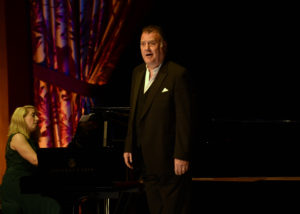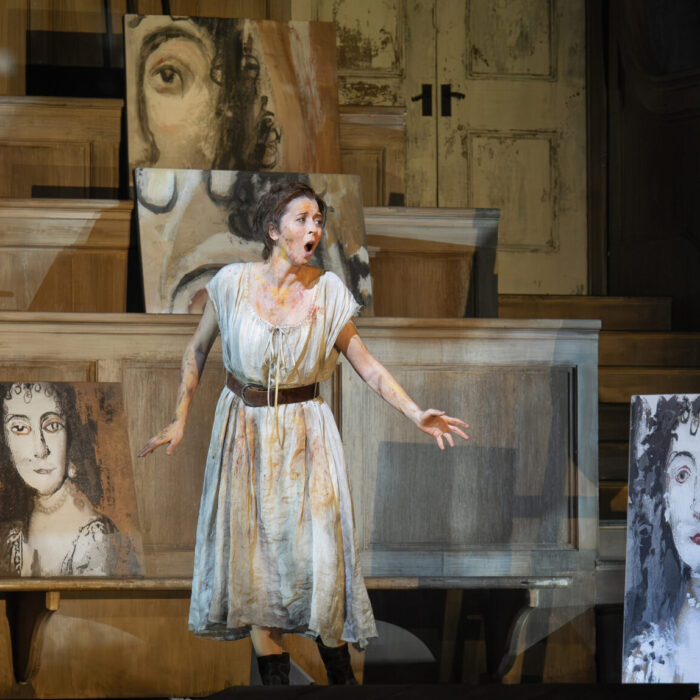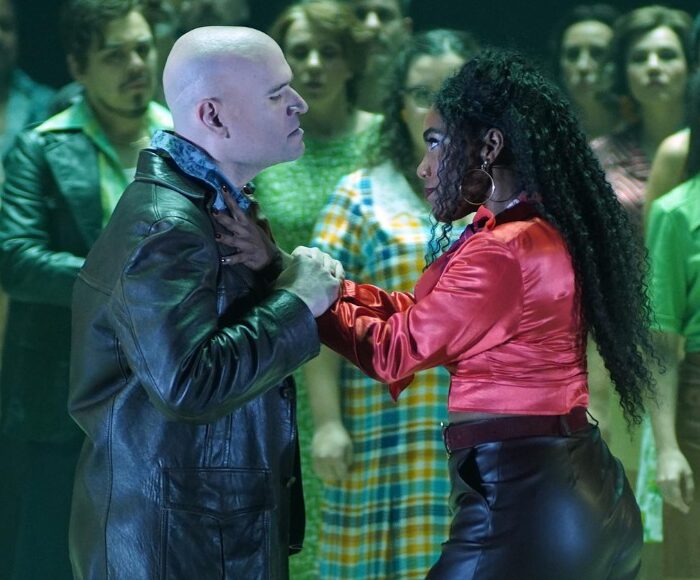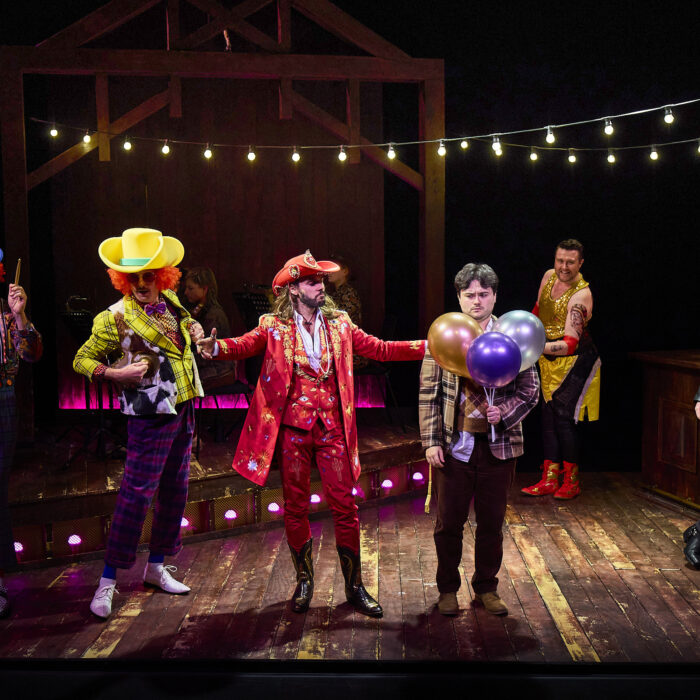
Opéra de Monte-Carlo 2021-22 Review: Sir Bryn Terfel in Recital
A Generous Performance from a Great Master
By Robert Adelson & Jacqueline Letzter(Credit: Alain Hanel)
On April 26th the Opéra de Monte-Carlo presented Sir Bryn Terfel in recital, marking the legendary bass-baritone’s first return to the Monaco stage since 2016, as his recital planned for February 2021 had been cancelled due to COVID travel restrictions.
If one had to choose a single word to sum up Terfel’s recital, it would be generous. To begin with, this was a long concert, lasting over two and a half hours. Few singers would dare to subject their voice to this kind of exposure, especially in such a taxing program. Moreover, the repertoire he chose was wide-ranging—a distillation of his rich career—going from Welsh folksong to English musical comedy, Broadway show tunes, English art song, German Lieder, French mélodie, and Italian and German opera; there was something for almost all tastes.
In addition to this stylistic variety, Terfel also treated the audience to a varied accompaniment. He was joined not only by the superb pianist Annabel Thwaite, but also by harpist Hannah Stone, who happens to be Terfel’s wife. Song repertoire originally composed for piano was performed with piano, while much of the folksong and lighter compositions were played with harp. Some of the most memorable moments of the evening were the works the musicians had arranged for voice, piano and harp. The relaxed Terfel, one arm leaning on the piano as he sang, allowed the audience to imagine themselves in a Welsh salon where family and friends gather around the harp and piano to sing their favorite songs.
An added touch of generosity toward his audience was Terfel’s decision to provide supertitled texts and translations (French and English) above the stage. Today, no one disputes the usefulness of supertitles in an opera performance, but in a Liederabend the projection of supertitles is rare. Indeed, the absence of texts in printed programs (or the darkened hall making such texts impossible to read in any case) raises the thorny question of how to help the audience understand a recital of songs in various languages. In addition to the helpful supertitles, Terfel also introduced almost every work on the program by giving a summary of the sung texts.
A larger-than-life vocal presence
Terfel’s generosity also extends to his vocal approach. In both his singing and his acting, he is an extrovert; not a quality one normally associates with a Lieder singer. The first half of the program consisted of music from the British Isles, beginning with Gerald Finzi’s Shakespearean “Let us garlands bring, Op.18,” composed in 1942 and dedicated to Ralph Vaughan Williams on the latter’s 70th birthday. The five songs of this cycle seem to have been tailor-made for Terfel’s voice, and there were plenty of opportunities for him to demonstrate his full-out fortissimo singing. But in the opening song, Terfel’s heartbreakingly simple delivery of the words “Come away” set a surprisingly pensive mood for what would only later become a rather boisterous evening. Other moments also highlighted the singer’s ability to add a richly hued color to his lowest register, for example on the low Bb on the word “grave” at the close of the third song “Fear No More the Heat o’ the Sun.” Terfel is at his strongest in English song, which he suffuses with a crystal-clear diction. The final “-st” at the end of the word “dust” was so well-defined, and so marvelously delayed, that it almost seemed as if the word had two syllables.
The power of Terfel’s voice is ideal for singing with orchestra, but at times his louder dynamic range seemed extreme for a recital in the small Salle Garnier. This problem may have been exacerbated by the hall’s acoustical quirks, as even his repeated “hey ding a ding a ding” in the fifth and final Finzi song “It was a lover and his lass” was swallowed up by the rather strident Steinway (even with the lid half open using the short stick) chosen for the concert.
The harp is the traditional instrument of Wales, and Hannah Stone (formerly Official Harpist to the Prince of Wales) delighted the audience with three solo works, judicially interspersed throughout the evening, in part to give Terfel a much-needed rest: “Bugeilio’r Gwenith Gwyn” by John Thomas, “Clair de lune” by Debussy and “Viejo Zortzico” by Jesus Guridi. Far from being mere filler, these moments were greatly appreciated by the audience, who delighted to hear these short pieces played with such sensitivity and abandon. Moreover, Stone’s charmingly self-effacing stage presence was an amusing contrast to that of her primo uomo husband.
The first part of the program ended with a set alternating between Welsh folksongs and songs by the Welsh actor, singer and composer Ivor Novello (1893-1951). This varied mix turned out to be the highlight of the evening, in which all three musicians participated as some of the songs were accompanied by piano, others by harp. Novello’s sentimental and witty compositions gave Terfel an opportunity to showcase his wide dynamic range and entertaining acting. The First World War classic “Keep the Home Fires Burning” took on a new relevance given current events, and the concluding “And Her Mother Came Too” was wonderfully droll.
Terfel began the second half with five Schubert Lieder. These were for the most part well chosen, as Terfel does not specialize in introspection, but rather shines in expansive works where he can exploit his acting and storytelling skills. “Gruppe aus dem Tartarus” was wildly dramatic, foreshadowing the Boito aria later in the program. It is difficult to quibble with such fine singing, but in “Litanei auf das Fest Aller Seelen D.343,” Terfel’s approach seemed a bit too histrionic and vigorous at the beginning. However, this interpretation served as a contrast to the serenely sung final phrase.
The recital continued with a group of songs about stars, including Debussy’s “Nuit d’étoiles,” Robert Schumann’s “Mein schöner Stern! Op 101 no.4,” “Stars” from Claude-Michel Schönberg’s score to “Les Misérables” and Wolfram’s “WieTodesahnung… O du mein holder Abendstern” from Wagner’s “Tannhäuser.” This set was slightly more uneven than the rest of the program. Terfel does not excel in French mélodie, and his outbursts of “Je rêve aux amours défunts” (I dream of bygone loves) in the Debussy were not as nuanced as one would have wished. On the other hand, Broadway excess suits him well, and the “Tannhäuser” aria was remarkably effective in the arrangement for the three artists, as the orchestral score features prominent solos for the harp.
The recital closed with two arias from Terfel’s CD “Bad Boys” (Deutsche Grammophon, 2010): “Son lo spirito che nega” from Boito’s “Mefistofele” (featuring Terfel’s devilish whistling) and a rambunctious interpretation of Don Pizarro’s “Ha! Welch ein Augenblick” from Beethoven’s “Fidelio,” a rather curious choice for a song recital, especially as a closing number.
All three artists were warmly applauded, and the first encore was given to Hannah Stone, who performed Deborah Henson-Conant’s flashy harp showpiece Baroque Flamenco, replete with percussion effects tapped on the instrument’s soundboard. It was then up to Terfel and Thwaite to perform the second encore: “If I were a rich man” from “Fiddler on the Roof.” Singing this tune in front of a Monte-Carlo audience was the supreme example of wry Welsh humor that Bryn Terfel brought to the recital. One was reminded of John Lennon’s famous remark when the Beatles performed before Queen Elizabeth in 1963: “For those of you in the cheap seats I’d like you to clap your hands to this one; the rest of you can just rattle your jewelry!” The third and final encore, performed in a lovely arrangement for all three musicians,was the Appalachian hymn “I Wonder as I Wander” by John Jacob Niles (1892-1980).
As theatrical and wide-ranging as this recital was, it thus ended as it began, with quiet and simple singing.



